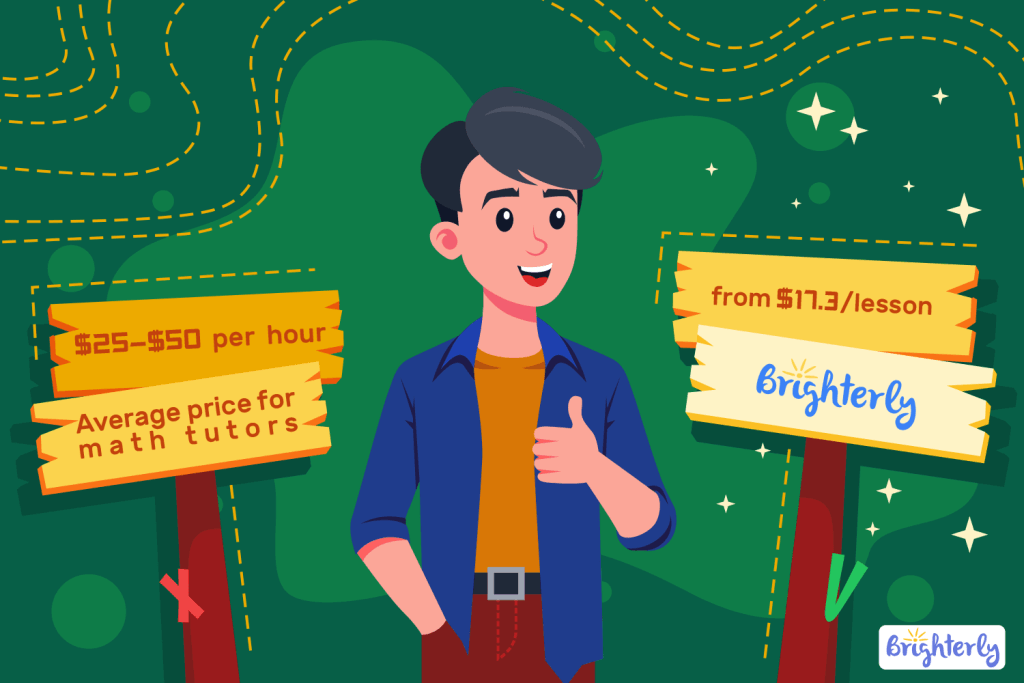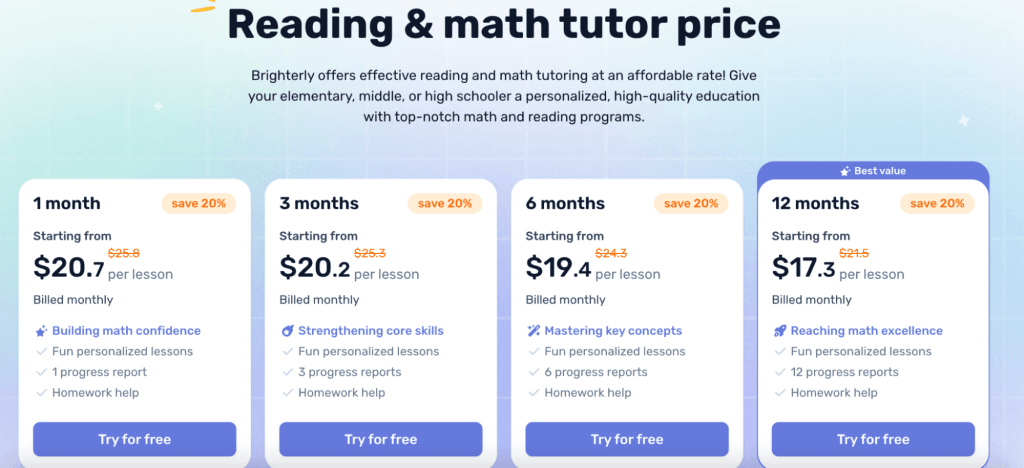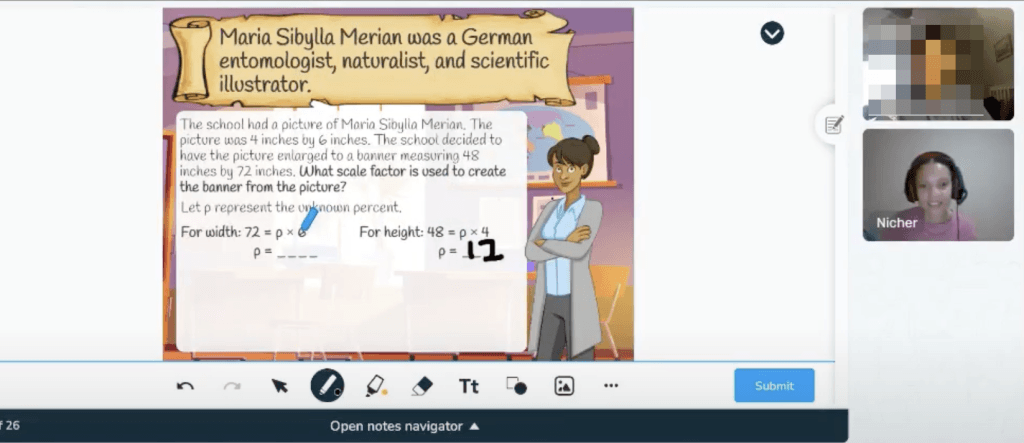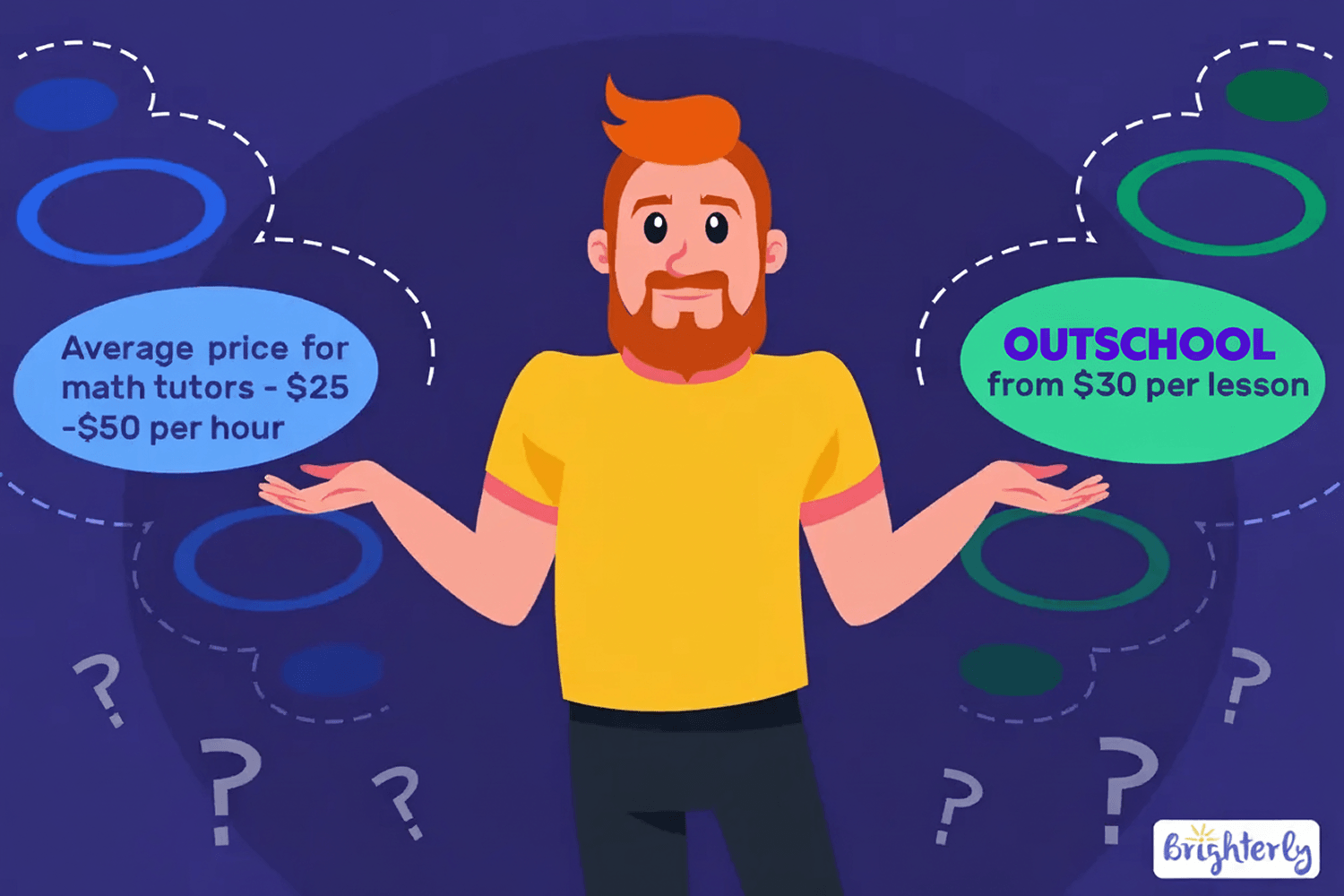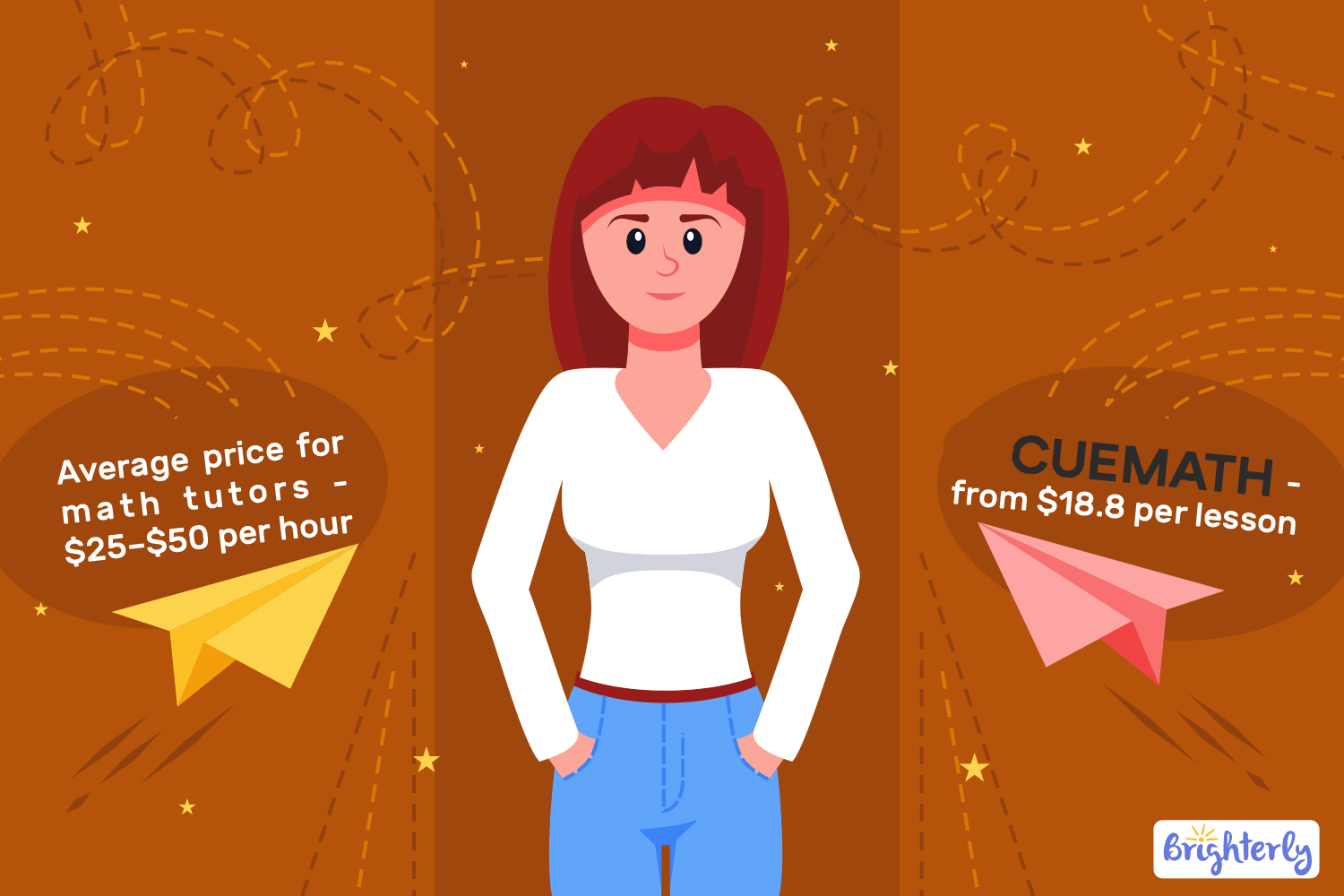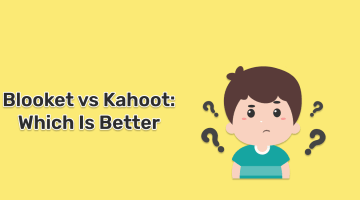Tutoring Rates Per Hour: Choosing the Right Option
reviewed by Jo-ann Caballes
Updated on January 26, 2026
You want the best education for your child, but are not sure what the tutoring rates per hour are to get the real value for money? I get it. As an active tutor constantly researching the market, I’ve gathered here everything I found on the average cost for tutoring per hour. After reading this review, you’ll know the exact prices and why they are so different!
Key points:
- The tutor rate for private lessons can vary from $25 to $80 per hour and higher, depending on the business offering the tutoring services.
- The exact hourly rate a tutor can offer to you varies based on their expertise, the amount of resources they provide, and the course duration.
- You can buy classes in bulk to get a cheaper hourly rate.
- Online studies from home are cheaper than offline sessions both for a student and a tutor due to the absence of commuting.
Exploring alternatives?
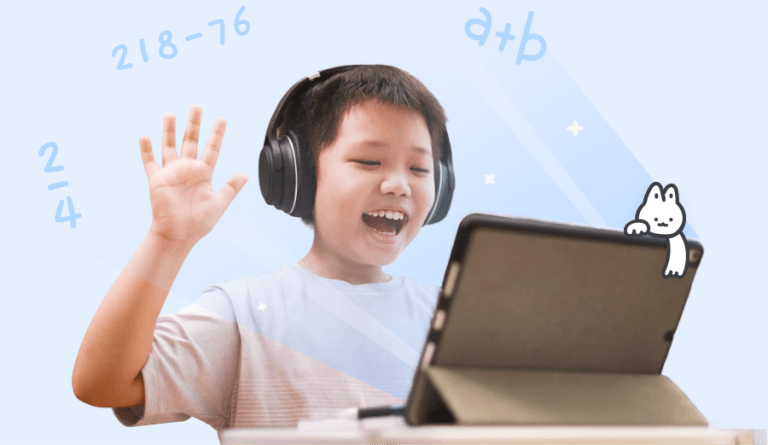
How much is math tutoring per hour?
The average tutoring rate ranges between $20 and $80 per hour. To get a more specific number, you need to refer to the tutoring service directly. The child’s age, proficiency, extra needs, and specific learning style can affect the exact cost. Also, the higher the tutors’ expertise, the higher the hourly rate you should expect.
How much is tutoring per hour per state?
The tutoring rate per state is between $38 and $65, with Kansas showing the lowest price range and Seattle showing the highest one.
| Seattle, Seattle, Washington | $55-65/hr |
| Hartford, Connecticut | $52-62/hr |
| Dallas, Texas | $48-58/hr |
| Sacramento, California | $45-55/hr |
| Colorado Springs, Colorado | $42-50/hr |
| Akron, Ohio | $38-46/hr |
| Kansas City, Kansas | $40-48/hr |
What is the rate for a private math tutor per hour?
Online tutoring pricing per hour is between $20 and $50, or even beyond, depending on the platform of your choice, the number of services and features it offers, and the learning format.
| Brighterly | Outschool | Cuemath |
| $17.3-$20.7 per lesson | $30+ per hour | $15.04-$17.63 per hour |
Brighterly vs average price for math tutors
These are the average tutoring prices on Brighterly vs. alternatives
The reading and math tutor rates per hour on Brighterly start from $17.3. Compared to the average cost of tutoring per hour, this rate is much lower and includes full support in improving kids’ math and reading skills. During personalized 1:1 sessions, kids can get assistance with homework, detailed reports, and feedback to share with parents.
Brighterly cost
- Learning Membership 1-month plan: From $20.7 per lesson.
- Learning Membership 3-month plan: From $20.2 per lesson.
- Learning Membership 6-month plan: From $19.4 per lesson.
- Learning Membership 12-month plan: From $17.3 per lesson.
Brighterly benefits
Personalized 1:1 tutoring
Brighterly reading and math tutors aim to create a highly personalized 1:1 reading and math program. It means that no matter which tutoring rates per hour you choose, your kid will still get help with homework, receive a progress report, and get 100% of the tutor’s attention during class.
Teachers also provide parents with recommendations on areas for improvement. This way, you can see what to do at home to help your kids boost their academic confidence.
Note: If you’re limited in funds yet want your kid to get a solid foundation in math, consider applying for the Math Equity Scholarship from Brighterly. As a low-income family, you can get $500 in financial aid, with six months of free 1:1 math lessons with Brighterly’s top tutors.
Flexible pricing that aligns with Common Core
Once you choose the Brighterly math and reading platform, be ready to get a highly personalized learning plan available at their reading and math tutor rates. The initial diagnostic test will help their professionals determine the current level and skills of your child relevant to their grade. Then, you’ll be able to define how many lessons and for how long your kid needs to attend to improve proficiency in math. The longer you decide to take, the less you pay per lesson.
All the classes provided by Brighterly tutors align with Common Core standards, as the teaching staff is skilled enough to deliver informative, interactive, and enjoyable lessons.
Free supporting materials
Brighterly offers plenty of free tests and worksheets for kids. And here you have a choice: you can sign up for tutoring classes to practice with a tutor or gain access to all the printable worksheets on the website to get good training at home.
To facilitate learning and make it more enjoyable, all tasks are different in format, including interactive visual lessons, multiple-choice questions, and gap-filling exercises.
Outschool tutoring hourly rate vs average price for math tutors
The average price range for academic, online tutoring for kids on Outschool is at least $30-$50 per hour. Compared to the average private tutoring rates per hour on other platforms, Outschool offers a decent service with good value for money.

Outschool pricing plans
Outschool pricing is based on the credit system, where 1 credit is around $0.45. Based on this, here are the average prices for tutoring on the platform:
- Group sessions: around 4-90 credits per class
- Individual sessions: around 10-100+ credits per class
On the official Outschool page, you can find these plans for group sessions:
- $40/month (around 1 group session per week)
- $70/month (around 2 group sessions per week)
- $120/month (around 3 group sessions per week)
- $240/month (around 4 group sessions per week)
- $380/month (around 7 group sessions per week)
- $600/month (around 10 group sessions per week)
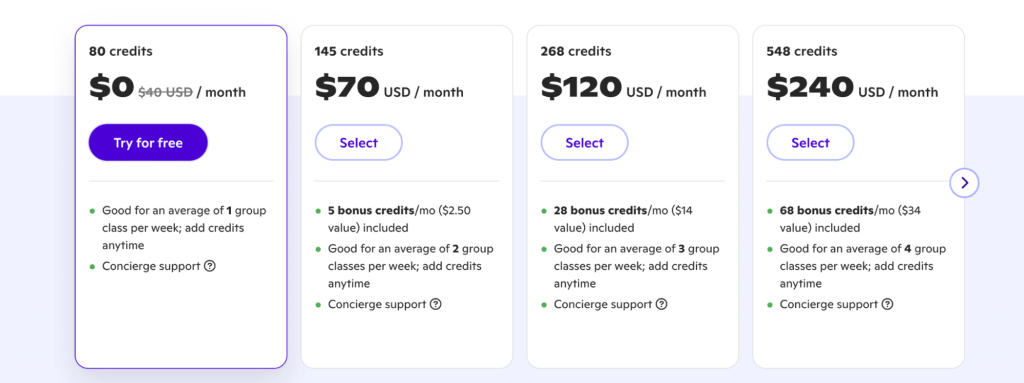
Outschool benefits
- Certified and experienced educators
- Access to specialized math topics
- Group and pre-recorded lessons
Certified and experienced educators
Outschool tutors undergo a vetting process, so you can be sure that all of them are certified to solve the chosen study issue. Their deep expertise helps students easily grasp even the most complex concepts.
Access to specialized math topics
Another benefit of Outschool is that it provides various classes, such as writing, coding, etc. Here, their tutors show the importance of math and general literacy and provide interesting tasks like budgeting, data analysis, and CV writing.
Group and pre-recorded lessons
Group lessons on Outschool allow parents to save money while still giving their children access to math education. If the cost is not affordable for you, you can book a group session or listen to pre-recorded classes instead. How much do private math tutors charge here? For instance, their Minecraft math group class costs $15/hour per student.
Cuemath math tutor rates per hour vs the average price for math tutors
Cuemath math tutor rates per hour start from $18.8 per class, making it a pretty affordable platform. Answering “How much is the average tutor per hour on Cuemath?”, it’s safe to say that it’s an affordable price and great tutors.
Cuemath tutoring cost
Kindergarten – Grade 7:
- Learning Membership 6-month plan: From $25 per lesson.
- Learning Membership 12+3-month plan: From $20 per lesson.
- Learning Membership 18+6-month plan: From $18.8 per lesson.
Grade 8 – Grade 12:
- Learning Membership 6-month plan: From $32 per lesson.
- Learning Membership 12+3-month plan: From $25.6 per lesson.
- Learning Membership 18+6-month plan: From $24 per lesson.
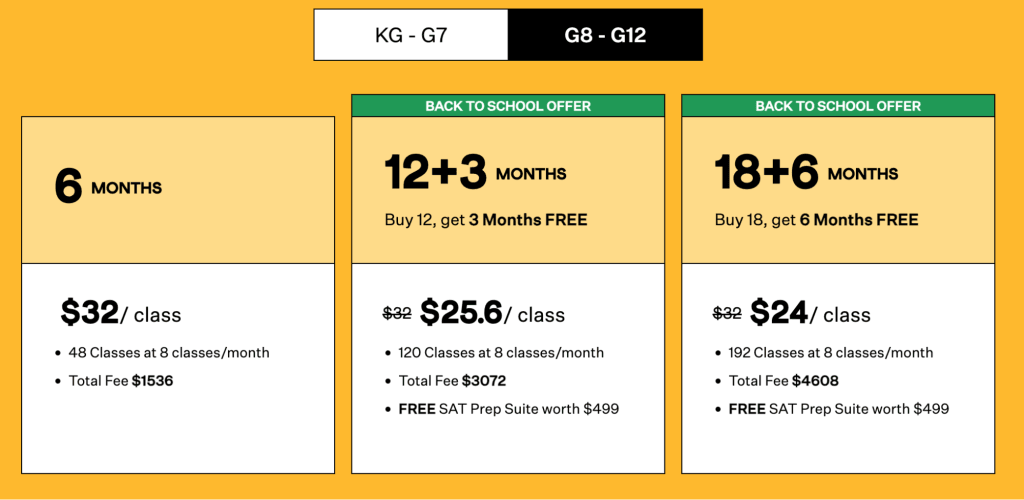
Cuemath benefits
Gamified learning experience
One of the main benefits of Cuemath is that they have visual learning tools and gamified exercises to make math more engaging. Students actively participate in actual problem-solving, which keeps them motivated in the long run.
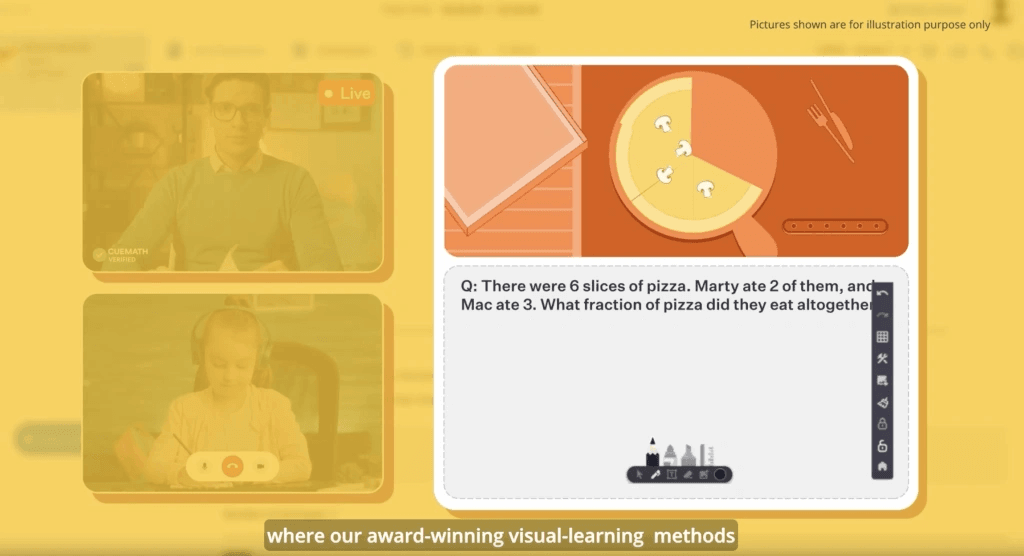
Focus on basic math skills
The Cuemath teaching approach is based on the balance between structured learning and fun, which makes it great for training basic math skills and knowledge. For advanced math learners, the platform provides a solid foundation to make their math practices more consistent.
Summer math course
Unfortunately, many kids forget what they have previously studied during long summer breaks, so Cuemath tutors decided to fight it with their summer break course. That way, you can be sure that your child won’t forget the subject they’ve learned throughout the year.
Math private tutor rates
- Average tutoring rates per hour: Elementary school students
- Average tutoring rates per hour: Middle school students
- Average tutoring rates per hour: High school students
Average tutor cost per hour for elementary school students
According to my research based on the most popular tutoring platforms presented in this article, the average math tutor rates for the youngest students vary from $23 to $75 per hour. Private tutoring fees for elementary students may change due to the session format, tutor’s qualification, and study goals. Ordering specialized classes may result in higher tutoring rates per hour.
What is the average cost of tutoring per hour for middle school students?
The average cost of tutoring per hour for middle school students typically ranges from $25 to $88.
Tutoring rates per hour at middle school vary based on the qualification, the number of booked lessons, and whether the sessions are in-person or online. Keep in mind that private tutoring rates per hour are usually more expensive than group sessions.
How much does a tutor cost per hour for high school students?
The math tutor rate per hour can vary from $30 to $100, since the students study complex topics and prepare for college so they need experienced tutors.
Online classes are cheaper, of course, since neither the student nor their teacher has to leave their houses. Besides, tutors outside of the US are also commonly hired these days.
11 factors that affect math tutor hourly rate
- Expertise
- Qualifications
- Location
- Tutoring formats
- Frequency and duration
- Materials and resources
- Demand and availability
- Researching local market rates
- Consideration of your child’s needs
- Negotiating and communicating
- Trial sessions
How cost of tutoring per hour is changed by their experience
The math tutor’s hourly rate is mainly based on the educator’s expertise. Generally speaking, the more experience, the higher the hourly rate for tutoring you’ll likely experience. If you have to choose between two similar teachers, the person with more years and more profound knowledge in a particular niche usually has a higher rate.
Another aspect that can affect tutor charges per hour is certifications and diplomas. As these tutors invested a lot of time, money, and effort in their education, the average cost of tutoring per hour would definitely be higher.
Cost of tutoring per hour: Qualification factor
Qualifications affecting tutoring cost refer to the tutor’s education, teaching experience, certifications, and area of expertise. Let’s say you need an educator for your child with ADHD. So, you’ll look for tutors for neurodiverse kids, which impacts the hourly tutoring rate.
Advanced degrees (Master’s or Ph. D.), teaching certifications, university teaching experience, knowledge of niche math areas, and unconventional teaching styles also have a direct impact on tutoring rates per hour.

Cost of tutoring per hour based on the location
The average cost of tutoring per hour will vary depending on the regional disparity. For example, tutors may be more expensive in cities with high living costs than in rural areas. Also, some states tend to have higher-than-average tutoring costs, so it’s essential to check normal tutoring rates specifically for your region.
Another thing to consider is travel expenses. You have to allocate enough budget to cover these tuition costs. Online tutoring can significantly reduce these expenses since the sessions take place in virtual rooms. If you want to save money on transportation costs, consider hiring a tutor through online tutoring platforms like Brighterly.
How the total cost of tutoring per hour depends on tutoring formats
Depending on your child’s specific educational needs, you can affect the cost of tutoring per hour by choosing between 4 standard formats, which I listed below.
In-person tutoring |
Online tutoring |
Group tutoring |
Learning center tutoring |
|
In this format, the tutor comes to the student’s house or has them over at their place. Here, they are physically present near the student. It affects the price since tutors take the average rate for a chosen location. |
If you crave the personalized approach but don’t want to be limited by geography, online tutoring is your choice. With this option, the tutor cost per hour doesn’t depend on your current location. |
It’s set in a small group of 3-5 students and one tutor. Group tutoring rates are generally lower since the lesson cost is fairly split between multiple students. | Learning centers are similar to school classes. However, instead of grouping based only on age, students here are grouped based on their current math skill and targets. |
No matter which format and tutor rates per hour you choose, the key is finding the right fit for your child’s learning style and academic goals. It’s always better to select the option that can tailor the study process to the child’s needs.
Cost of tutoring per hour based on session frequency and duration
As some kids are slower and some are faster in learning, your final budget regarding the tutor rates per hour may change dramatically. Fast learners may only need several supplemental lessons per month that might last from 45 minutes to an hour. But the sessions with the kids who require extra attention from the tutor and more effort may last up to two hours and appear more frequently.
That’s why many online tutoring websites offer flexible pricing that fits the needs of any kid and their proficiency.
How materials and resources affect the cost of tutoring per hour
Private math tutoring rates may change depending on the learning materials used to teach kids. Generally, tutors use standard books and worksheets. However, some children may have specific learning styles or cognitive peculiarities that require different learning materials. In such scenarios, the cost of lessons may be slightly higher.
For example, there are specific books and worksheets for children with ADHD, dyslexia, or problems with hearing or eyesight. Also, teachers can use audiobooks and videos with subtitles to help kids who have a specific learning style.
How the cost of tutoring per hour fluctuates based on demand and availability
Math tutoring prices also vary depending on the availability of the teachers and the number of tutoring requests in your local area or in general. The more requests and the fewer tutors available, the more expensive classes can get, and vice versa.
You’ll likely encounter this problem if you’re looking for a tutor on your own. That’s why opting for dedicated platforms can make your search more convenient and faster. Tutoring websites allow parents to choose various payment plans with fixed prices per class, thus helping them better monitor their expenses and always stay up to date with the current pricing conditions.

Cost of tutoring per hour: Researching local market rates
The difference between the average tutor fees per hour and the local market rates depends on the demand and supply dynamics. While the nationwide average tutoring prices may fall between $25 and $80, there may be higher or lower prices in a local market. This can be explained by the demand for math tutoring and the given city or area’s cost of living.
Cost of tutoring per hour: Considering your child’s needs
Tutor charge per hour may also change if your kid needs a more individual approach due to their cognitive conditions or learning styles. Since some students have ADHD or autism, a tutor has to consider this and set an appropriate learning plan. This adjustment may take up more of their resources, include new learning materials, and require extra time to help the kid adapt to the lesson.
The price per lesson may also depend on the child’s learning style. If they are more of an auditory or visual learner, tutors may prepare extra materials to facilitate the learning process, which can also come at an additional price.
Tutoring average hourly rate: Negotiations and communication
Being a good communicator can help you get lower tutoring prices, including math session packages and reading tutoring cost. If you want to benefit from your negotiation skills, consider the following arguments:
- Be polite and outcome-oriented
- Show enthusiasm about the tutoring services, but communicate your budget limitations
- Demonstrate readiness to study regularly and purchase a package
Some tutors are open to giving you a discount, but they are interested in regular and pleasant clients in this case.
Сost of tutoring per hour: Trial sessions
Many platforms offer trials, so you can check whether the average cost of tutoring per hour matches your expectations. For instance, Brighterly reviews tell that the service provides the first free lesson to evaluate a student’s skills and needs. During this time, you can ask tutors any questions and understand how long the learning plan may take to bring you closer to your learning goals.
Understanding private tutoring rates per hour
Choosing the right math tutor depends on your budget, your child’s learning needs, and your desired personalization level. If you are looking for a platform with group and private lessons, take a closer look at Outschool. If you are more of a fan of pre-made curricula, consider Cuemath.
Brighterly pricing suits those who want to get a personalized study plan that is aligned with the Common Core. The platform’s standard tutoring rate offers engaging, one-on-one lessons starting at $17.3 per hour, making it a great choice.
Book free lesson today and start investing in your child’s success!


